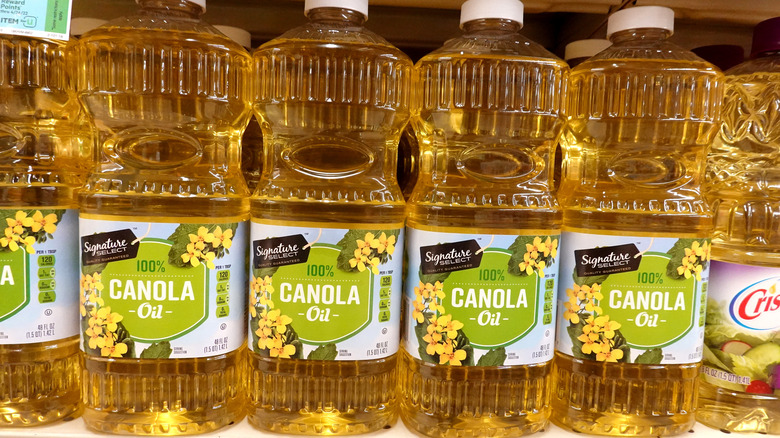False Facts About Canola Oil You Thought Were True
Canola oil is one of the most common types of cooking oil in the United States. Not only will you find bottles on grocery store shelves for cooking at home, but it's also in a lot of processed and packed products. Some people have negative opinions about canola, but the truth is there's a lot of misinformation flying around about it.
Like any other oil, you should consume it in moderation, but canola has been unfairly vilified. It's commonly believed that it's devoid of nutritional benefits, and many people also think that it has unsafe levels of trans fats and can cause chronic inflammation in the body. However, these notions are unfounded. That's why we wanted to get to the bottom of the canola oil debate.
Rather than being some evil oil that can kill you in 50 different ways just by looking at it, perhaps canola is just misunderstood. We're going to delve into the false facts about canola oil you thought were true, and sort fact from fiction. By the time you've finished reading, you might have very different opinions.
False: Canola oil and rapeseed oil are exactly the same
While canola oil and rapeseed oil are very similar, they aren't the same. The terms are sometimes used interchangeably (and you could substitute one for the other in most recipes), but there are some subtle differences. Canola oil and rapeseed oil are derived from the same plant species, Brassica napus, which is part of the mustard family. However, canola oil is a specific type of rapeseed oil that has been selectively bred to have lower levels of erucic acid and glucosinolates. The term rapeseed oil, on the other hand, can be used to refer to canola or non-canola rapeseed oil.
Canola oil contains less than 2% erucic acid, while traditional rapeseed oil can contain significantly higher levels. Erucic acid in high amounts can be harmful to health, potentially causing heart problems, so the reduction of this compound in canola oil makes it safe to consume. Canola also has lower levels of glucosinolates compared to traditional rapeseed oil. Glucosinolates can impart a bitter taste and may have negative health effects in high amounts.
There may be regulatory distinctions between canola oil and rapeseed oil in different regions. For example, in some countries (including the U.S. and Canada), the term "canola" is used specifically for the low-erucic acid varieties of rapeseed oil that meet certain standards set by regulatory agencies. In others (including the U.K.), the term rapeseed oil is used to describe canola oil.
False: Canola oil has no health benefits
It's a common misconception that canola oil has no health benefits. It's often thought of as a cheap oil that's useful but doesn't provide anything in the way of nutritional value. We hear that olive oil might help you live longer and is good for your health, but maybe it just has better PR than canola.
Canola oil is one of the few vegetable oils that contains a significant amount of alpha-linolenic acid (ALA), which is a type of omega-3 fatty acid. Omega-3 fatty acids have anti-inflammatory properties and may boost heart health, brain function, and overall well-being. It's low in saturated fat and high in unsaturated fats. These healthy fats (including omega-3) can help reduce low-density lipoprotein (LDL) cholesterol levels (the "bad" cholesterol) and lower the risk of heart disease when substituted for saturated fats in the diet. Some research suggests that the monounsaturated fats and omega-3 fatty acids in canola oil may also help lower blood pressure, which is a risk factor for heart disease and stroke.
What's more, canola oil is a good source of vitamin E, an antioxidant that helps protect cells from damage caused by free radicals. Vitamin E also plays a role in immune function, skin health, and blood vessel health. In short, there's way more to the health benefits of canola oil than you might have imagined.
False: Trans fats in canola oil make it dangerous
Trans fats are unsaturated fats that can have harmful health effects when consumed in high amounts. Some people claim that canola oil has high levels of trans fats and is therefore dangerous. However, this is based on some myths and misconceptions.
Canola oil has a low trans fat content, at around 1.9% to 3.6%. Unlike partially hydrogenated oils, which are artificially created and contain high levels of trans fats, canola oil's trans fat content primarily comes from the small amount that forms during the refining process. All refined vegetable oils contain low levels of trans fats, roughly comparable to those found in canola oil. So, if you're concerned about the trans fats in canola, you should be concerned about the trans fats in every plant-based oil.
The trans fat content of canola oil is similar to that of other naturally occurring sources such as animal fats and cow's milk. These trans fats make up a very small percentage of the total fat content and are not considered harmful in moderate amounts. As part of a balanced diet, the trans fat content of canola oil is nothing to be overly concerned about.
False: Canola oil is toxic because it's processed with hexane
Hexane is a solvent commonly used in the extraction process of many vegetable oils, including canola oil. It's a colorless, volatile liquid hydrocarbon derived from crude oil refining. Hexane is favored for its ability to efficiently extract oil from seeds. There's a common belief that canola oil is toxic because of the hexane it contains — but this is untrue.
During the production of canola oil, hexane is used to help separate the oil from the canola seeds. After the oil is extracted, it goes through a refining process to remove impurities and any residual hexane. Minute traces of hexane remain in the finished canola oil, yet this isn't something that consumers should be troubled by.
The levels found in finished canola oil are extremely low and well within the safety limits established by regulatory authorities. Yes, hexane is a toxic substance, but it has very low toxicity and would have to be consumed in large quantities to be a problem. The minute amounts of hexane remaining in oils after extraction and refining processes are not considered harmful to human health. We can understand people's apprehension about eating foods that have had toxic solvents involved in their production, but this is fairly common — and difficult to avoid — with processed foods.
False: Canola oil causes chronic inflammation in the body
Have you heard that canola oil causes chronic inflammation in the body? If so, you might have fallen foul of a false fact. This belief has circulated in some circles, often fueled by misinformation or misinterpretation of scientific studies. So, let's look at why people claim this to be true — and why they're wrong.
Canola oil contains omega-6 fatty acids, which are essential fats that the body needs for various functions. Some studies have suggested that excessive intake of omega-6 fatty acids relative to omega-3 fatty acids may promote inflammation. However, it's important to note that the ratio of omega-6 to omega-3 fats is just one factor in bodily inflammation, and the ratio of omega-6 to omega-3 isn't that out of whack. The ideal ratio is considered 1:1, while the average person in the U.S. consumes 15:1 omega-6 to omega-3. Canola oil contains a 2:1 ratio of omega-3 to omega-6, which isn't far off the ideal.
Some studies have examined the effects of different dietary fats on inflammation markers in the body, but the results are often mixed and context-dependent. There's currently no research to suggest that canola oil causes chronic inflammation. However, proponents of this theory may be twisting or misinterpreting research data.
False: Canola oil is bad for you because it's genetically modified
You might have heard that canola oil is bad for you because it's genetically modified. But, while most canola crops are genetically modified (around 90% are in the U.S.), this doesn't mean that they're bad for your health. Scientific consensus and extensive research indicate that there's nothing inherently less healthy or harmful to human health about GM foods compared to conventionally produced foods.
GM foods are assessed for safety before they're allowed to be sold. In the case of the U.S., the FDA evaluates the safety of GM crops before they go to market. A principle commonly used in the evaluation of GM foods is substantial equivalence, which compares the GM crop to its non-GM counterpart to ensure that they are essentially the same in terms of composition, nutritional value, and safety. If a GM crop is found to be substantially equivalent to its non-GM counterpart, it is considered safe for consumption. This means GM canola oil is not less safe than canola oil that comes from crops that haven't been genetically modified.
While the safety of GM foods for human consumption is well-supported by scientific research, concerns about their environmental impact are more valid. These concerns often revolve around issues such as biodiversity loss, the emergence of herbicide-resistant weeds, and the potential for gene flow to wild relatives of GM crops. So, there's no need to avoid canola oil for cooking.
False: Canola oil has a very high smoke point
The smoke point of an oil is the temperature at which it begins to produce visible smoke when heated. This occurs when the oil breaks down and starts to degrade, releasing volatile compounds, which can make the foods being cooked taste bad. Smoke points vary between different oils. Oils with higher smoke points are better suited for high-heat cooking methods such as frying, sautéing, and deep-frying, as they can withstand higher temperatures without smoking or burning.
Canola is commonly cited as having a very high smoke point. However, this isn't strictly true. Canola oil has a smoke point of 400 degrees Fahrenheit. This is somewhere in the middle of the range. Safflower oil has a smoke point of 510 degrees Fahrenheit, which is among the highest. On the other end of the scale is extra virgin olive oil, with a 325 to 375 degrees Fahrenheit smoke point, which makes it unsuited for many cooking uses. That said, oils with smoke points of 400 and over are suitable for all kinds of high-heat cooking. So, even if canola doesn't have the highest smoke point around, it's still high enough that you can use it for deep-frying, searing, and sautéing.
False: All canola oil is highly refined
It's a common misconception that all canola oil is highly refined. While much of the canola oil available on the market undergoes refining processes to remove impurities and improve shelf life, there are also options for minimally processed canola oil, such as unrefined, expeller-pressed, or cold-pressed varieties. These varieties are basically the extra virgin olive oil of the canola world.
The more gentle extraction processes help preserve the natural flavor and aroma. Cold-pressed canola oil tends to have a somewhat nutty or grassy taste with subtle earthy notes, while processed canola oil has a milder flavor and aroma due to the refining process. Cold-pressed canola oil retains more of the natural color of the canola seeds, making the oil a vibrantly golden yellow. So, if you're looking at cold-pressed canola oil, you'll know it. It's also worth noting that unrefined canola oil may contain more nutrients. Some nutrients are lost in the refining process, so cold-press varieties are generally higher in vitamin E, as well as containing tocopherols and phytosterols — bioactive compounds with antioxidant properties.
While both cold-pressed and processed canola oil can be used for cooking, salad dressings, and more, there may be times when one is better suited to the recipe than others. Some people love the rich taste of unrefined canola, but sometimes you need the neutral flavor of refined canola oil.
False: Canola oil negatively impacts memory
Some people believe that canola oil negatively impacts memory, but, there's no data to support this. The basis of this myth comes down to misinterpretation and misreporting of a scientific study.
In 2017, researchers released the results of a study they'd done about the consumption of canola oil in mice. The study aimed to see if canola oil had any impact on the development of Alzheimer's disease. It was widely reported in the media that the results of the study showed that consuming canola oil led to an increased risk of Alzheimer's, but this wasn't true. Rather, it was an example of how the media often misinterprets scientific data.
What the study concluded was that there appeared to be no protective effect on the memory from consuming canola oil. It doesn't follow that canola oil causes Alzheimer's disease, just that it might not offer the same cognitive benefits that some scientists believe olive oil does — which is what the research was trying to determine. But, it's also worth remembering that this is just one study, plus it was a study in mice, not humans. This means that not much can be extrapolated from it without further research. Canola oil has a similar profile of good fats as olive oil, so future research could potentially show that it positively impacts memory.
False: There's a correlation between canola oil and type 2 diabetes
In some circles, there's a belief that canola oil can cause type 2 diabetes. You may even have seen a graph that did the rounds on social media. This graph compares two sets of data. One is the amount of seed oil (including canola oil) consumed over the years. The other is the incidence of type 2 diabetes and obesity. It shows the levels of seed oil consumption increasing over the years, and also the levels of type 2 diabetes and obesity increasing roughly in line with it. Some people might assume this is stark proof of a link between the two, but that's a misunderstanding of data and how it's analyzed.
You see, if you plot any two things on a graph, you might see an increase in both of them over time. For instance, you might see a steady rise in the number of LGBTQ+ characters depicted in the media over the years, but this doesn't mean that LGBTQ+ representation causes type 2 diabetes. There's no proof that canola oil and other seed oils play any part in the incidence of type 2 diabetes. It's more likely that there's a link between eating ultra-processed foods and diabetes — not that there's a danger of developing diabetes from cooking a stir-fry with canola oil or making a canola oil salad dressing.
False: There are limited ways to use canola oil
Many people assume that there are only limited ways to use canola oil. It's seen as a cheap oil that's great for deep-frying because it doesn't cost too much to fill up a pot with it. People also assume it's good for sautéing when you don't want the flavor of olive oil or other strong-tasting oil to come through. And, while canola is good for these purposes, it has other uses, too.
Canola oil is great for salad dressings. While more flavorful oils, like olive oil, are often used, canola oil's mild flavor and light texture make it an excellent base for dressings. Simply combine it with vinegar, citrus juice, herbs, spices, and other flavorings and the dressing won't be overwhelmed by fruity olive oil. For the same reasons, it's a good addition to marinades. It's also an amazing choice for baking because it doesn't impart a flavor to baked goods. Cakes that use oil as the fat are often moister with a more tender crumb.
Then, there's cold-pressed canola oil, which gives you even more options. Because of its notable flavor, you can use it similarly to extra virgin olive oil. You can drizzle it over salads and other dishes to finish them and it's great used as a dip for bread, along with some balsamic vinegar.











